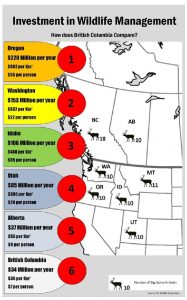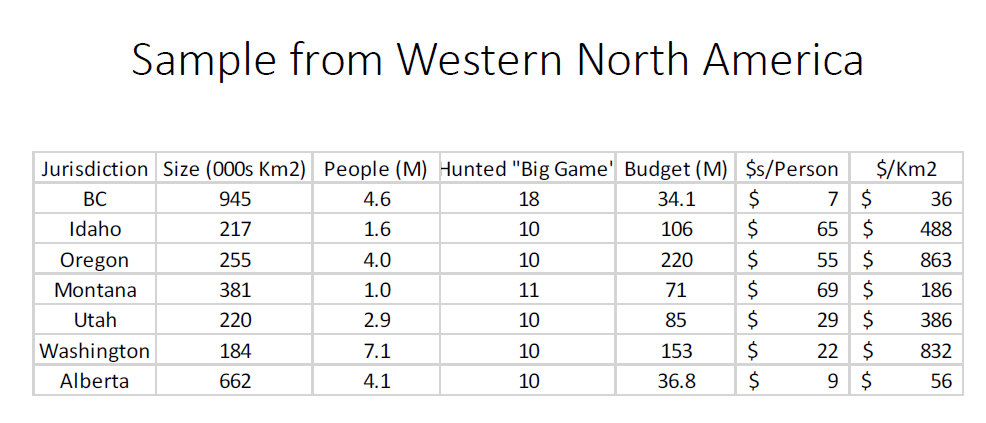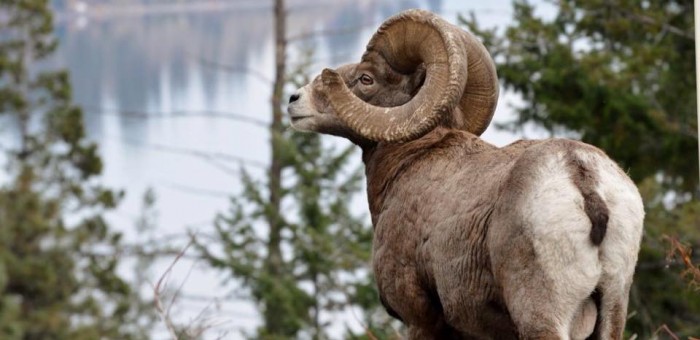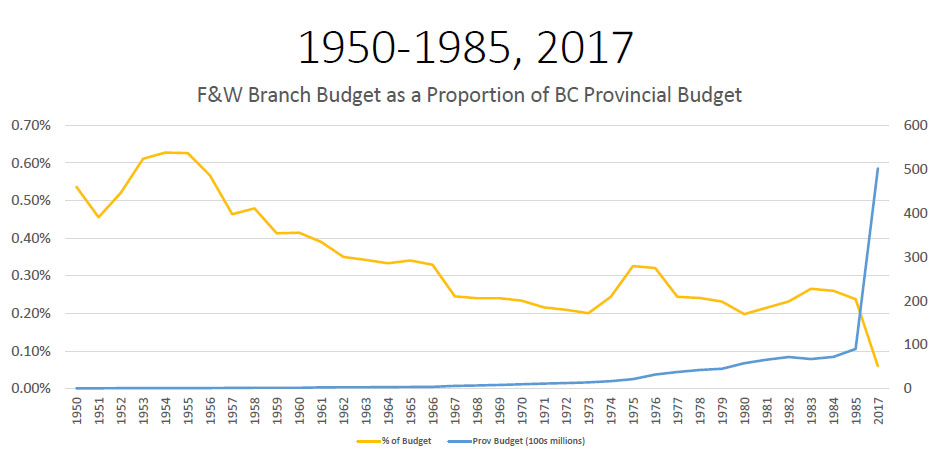Before it’s too late: British Columbia needs a science- and ecosystem-based approach to wildlife management
At the time of European contact, wildlife were so abundant in British Columbia that early explorers marveled at the richness of the land.
“The country is so crowded with animals as to have the appearance in some places, of a stall yard,” Alexander Mackenzie wrote in his journal in 1793 while on the Peace River. He reported seeing herds of elk on the grasslands near Bear Flat, the irreplaceable habitat that will be drowned when the Site C dam is constructed.
Just over a decade earlier, on the West Coast of Vancouver Island, Captain James Cook noted an abundance of sea otters. He traded pelts into China, sparking a rush for furs that didn’t abate until sea otter populations crashed. It was the first example, in what would become known as British Columbia, of economic forces eradicating a species.
Early European settlers established markets not only for furs, but also for the hides and meat of wildlife. The uncontrolled harvesting that followed soon led to the extirpation of Roosevelt Elk on the Lower Mainland and Wood Bison in northern B.C.
By the late 1800’s wildlife losses were so widespread the public began demanding an end to the free-for-all. In 1859 the first ordinances “providing for the protection of game” were passed in B.C. In 1905 the government organized wildlife management, establishing the Department for the Protection of Game and Forests, although it didn’t get funding until 1908. The annual budget: $10,000.
In 1933 Aldo Leopold, an American conservationist and writer, published Game Management, a book that has been credited with creating the discipline of wildlife management through the application of scientific principles. Indeed, his work planted the seeds of what would eventually become the North American Model of Wildlife Conservation.
One of the key tenets of the Model, which is now widely applied across the continent, is that science – not the dictates of special interest groups – should guide wildlife policy.
I have dedicated my life to understanding our world and its problems through science, but have been surprised at how difficult it is to convince governments to consistently follow scientific reasoning. While the concept of science-based wildlife management has generally been endorsed in B.C. it has not always been applied.
There have been successes. Sea Otters are making a comeback, elk herds are increasing in southern B.C. and bison were successfully reintroduced to some areas in the north. But its selective use has lead to more disasters.
Many wildlife populations are in jeopardy today. Mountain caribou are facing extirpation, wild salmon – a foundation species – are in shocking decline, spotted owls are virtually extinct, and moose populations, which many rural families rely on for sustenance, are in trouble across the province.
What we find in almost all of these instances is that there has been inadequate science, particularly concerning cumulative impacts, and that an unacceptable loss of vital habitat has occurred. The management of wildlife, and the application, or not, of scientific principles, continues to stir great controversy and emotional debate in B.C. Understandably so.
Wildlife management conflicts in which species are pitted against one another are truly challenging, but I have always maintained that humans – elected representatives in particular – have a moral obligation to prevent endangered species from going extinct.
Often, extreme situations are created because government has failed to act. They are typically situations that – for a variety of industrial, social, or budgeting excuses – have been allowed to escalate far past a point of simpler intervention.
When you start rationalizing culling one species to protect another you also introduce an ethical element that needs to be considered alongside scientific findings. Let one – or both – of those species become threatened or endangered, however, and your situation becomes immensely worse.
Some say that humans should not interfere with nature, but sadly, intervention is sometimes necessary. Simply put, many ecosystems have been altered so drastically that we can no longer just stand by and let nature take its course.
If we don’t continue to intervene with the mountain caribou crisis we are currently facing, for example, it will not be long before the remaining herds in the South Selkirk and Peace regions are extirpated.
We cannot let that happen.
Predator control, hunting closures, and restrictions that stop industries from undertaking resource developments are all difficult matters for governments to deal with.
But things aren’t going to get easier. The management of wildlife is becoming increasingly complex and fraught with risk.
Habitat loss is mounting.
The human population is growing.
Roads and pipelines have been spreading into the farthest reaches of the province, and researchers have discovered how such developments increase predation, shift wildlife distribution, and impact abundance.
Wolves, for example, use road and pipeline clearings to get a good line of sight on caribou, expanding into new territory to more efficiently track down their prey. Increased road densities and human activity in wilderness areas elevates human-caused mortality of grizzly bears and reduced the number of bears in the area, scientists at the University of Alberta have recently found.
In a paper published this week in the journal Conservation Biology, scientists wrote about threats to biodiversity from cumulative human impacts in B.C., “one of North America’s last wildlife frontiers.”
“Land-use change is the largest proximate threat to biodiversity yet remains one of the most complex to manage,” they wrote. “For ecosystems, we found that bunchgrass, coastal Douglas fir, and ponderosa pine have been subjected to over 50% land-use conversion, and over 85% of their spatial extent has undergone either direct or estimated indirect impacts.”
Adding to all these other stressors now is climate change. The full implications aren’t yet clear, but we cannot situate our wildlife strategies in the past. Our environment is changing and will continue to do so.
We must be prudent and precautionary as we manage our changing landscape as the planet warms. The timing and abundance of food availability, for instance, will shift for some plants and animals. Species reliant on their stability will need space and additional resources if they are to adapt.
Another challenge that will become increasingly present in B.C. is that of invasive species. Not species introduced from a faraway land, though that will continue to be an issue, but species that have migrated from nearby landscapes as their own native environment ceases to meet their needs — climate refugees, in a sense.
As certain areas become warmer, for example, native species may start to move north. How will we manage those newcomers if they are having a negative impact on our own resident species? What if the invasive species are threatened or endangered in their home ecosystem?
 A few years ago, with concerns growing about how B.C. was managing wildlife in the face of growing pressures, the B.C. government assigned an MLA to do a comprehensive review of its policies.
A few years ago, with concerns growing about how B.C. was managing wildlife in the face of growing pressures, the B.C. government assigned an MLA to do a comprehensive review of its policies.
“There has never been a time in British Columbia’s history where balancing the cumulative impact of resource development and biodiversity has been so complex.” Liberal MLA Mike Morris wrote in his 2015 report, Getting the Balance Right: Improving Wildlife Habitat Management in British Columbia.
“There is an urgency and heightened concern amongst resident hunters, guide outfitters, trappers, the wildlife viewing industry and conservationists that the province is not acting quickly enough to address the decrease in wildlife populations and the degradation of wildlife habitat,” Morris wrote.
He called for more wildlife management staff and “better planning, better science and more timely and effective implementation of policies and programs.”
But the government never delivered.
“B.C. balks at changing law to protect wildlife and biodiversity” said The Vancouver Sun headline.
“The B.C. government will not be changing laws or considering hiring more staff as recommended in a report by one of its own MLAs on how to protect wildlife and biodiversity from the effects of resource industries,” the story said.
For far too long government has shortchanged wildlife management in B.C.
It’s fine for Ministers to say they support science-based decisions – but where is the science? Where are the field researchers? Where are the basic boots on the ground that are needed to keep a close watch on our wildlife populations and habitat?
The necessary funding just isn’t there.
B.C. ranks behind its neighbours in the northwest when it comes to investment in wildlife management. Alberta, Washington, Montana, Oregon, Idaho, Utah – all spend more on managing less.
The shameful underfunding of wildlife management has taken place under successive Liberal regimes. Now we have a new NDP government, but it has yet to show if it will fully embrace – and fund – science-based management.
The problem is compounded because Ottawa too has been cutting back on wildlife science. In B.C. our wild salmon stocks are in decline, putting in jeopardy not only the economies of fishing communities, but also the health of killer whales, bears, eagles and other predators.
But a study published recently concluded, “there is inadequate information to determine the biological status of roughly one-half of all CUs ” in B.C.
CUs, or Conservation Units, are the system by which the federal government is supposed to monitor and manage our wild salmon stocks.
But Canada’s Wild Salmon Policy: an assessment of conservation progress in British Columbia reports that the government just basically gave up on collecting the data. We don’t know what is happening on the rivers because the government stopped keeping track.
“Our state of knowledge regarding salmon populations is eroding rapidly. Without increased support for escapement surveys and the transfer of knowledge to the next generation, the rich legacy of population data available for BC’s north and central coasts is at serious risk of becoming irrelevant for future assessments of management and conservation status,” states the study led by Simon Fraser University researchers Michael Price and John Reynolds.
B.C. is Canada’s most ecologically diverse province but if we are to maintain that rich biodiversity, we need to see a serious commitment to science-based, evidence-based wildlife management – and we need to have dedicated wildlife funding put in place, so managers have the budgets, and the staff, required to do the job.
As the Select Standing Committee on Finance and Government Services recommended in its Report on the Budget 2017 Consultations, license fees collected from natural resource users (hunters, anglers, ecotourists, etc.) should be directed into conservation and wildlife management services, rehabilitation, enforcement and education. In that, we must “prioritize and fund restoration and protection of endangered fresh and saltwater fish species and fisheries.”
Effective natural resource management is reliant on funding, science, and social support. We seem to have consensus on this within the B.C. government, but it needs to be put into action.
Prior to the election, I campaigned on establishing a Natural Resource Commissioner who could lead a Natural Resources Board responsible for establishing sustainable harvest and extraction levels and reporting on the state of B.C.’s environment and natural assets. The NRB, I proposed, would conduct cumulative impact assessments, and oversee the professional reliance model.
Since the election, the government has been working with us to improve the professional reliance model and B.C.’s environmental assessment process. We haven’t talked about creating a Natural Resource Commissioner position, but there is much we should to advance its values of scientific monitoring, reporting, and cumulative assessment.
Managing wildlife has always been difficult, but never more so than now, in the face of climate change. According to data released by scientists at NASA, 2017 was the second warmest year since record-keeping began in 1880, second only to 2016.
In the face of great challenges, it is clear to me that we need a comprehensive science- and ecosystem-based approach to wildlife management. We simply cannot continue to perpetuate the slow, methodical extirpation of native species in B.C.
Ecosystem-based management calls for natural resources, habitat, and species to be managed collectively, over a long time frame, rather than just looking at a single sector or single species.
Cumulative impacts are assessed – an approach which B.C. urgently must follow because of the sweep of industrial development now taking place in many sectors of the province.
Given the myriad challenges facing wildlife in our province, two of the best things we can do to protect biodiversity is to leave key habitat areas intact and fund environmental science. As the global climate warms and precipitation patterns shift, having a complete ecosystem within which animals and plants can try to adapt will be essential, and frankly it is the least we can do given the dire situation many species are in. Having an informed understanding of the changes taking place will help too.
It won’t be easy. But proactively protecting ecosystems – so we can all be resilient to the changes a warming climate will bring – is vital.






25 Comments
I welcome Mr. Weaver’s call for the province to produce science for the management of our wildlife and natural resources.
The bear backlash should be doing the same.
Let’s have a ‘Fish and Wildlife’ branch again with a strong enforcement presence.
I think science was used in this decision. If the goal is to maintain and enhance the bear population why would you not eliminate a mortality factor from the equation. Contrary to what the hunters will tell you, shooting bears is not a management tactic. It is done for money.
With all due respect, Don Heppner, I have to ask if your statement in regards to bear management and hunters views on it is a scientifically based one, or if that too is emotional? There are pros and cons to the grizzly bear hunt, and all hunting. However, it was my understanding that biologists suggested that the grizzly bear hunt was 100% sustainable, and that grizzlies were, in fact, being underharvested. I believe those findings were scientifically based.
For the record, I was not involved in any discussions regarding the Grizzly bear hunt ban. The BC NDP campaigned on “banning the grizzly bear trophy hunt” without defining what that is or was. They came up with an initial cockamany idea of requiring people to submit the head and coat and pack out the meat. Then they decided to ban all hunting.
I tried for three years to get emotion out of the discussion of wildlife management. I wish the BC Liberals had actually acted upon Mike Morris’ report. We need a massive investment in wldlife conservation.
There is no doubt that the decision to ban the hunt was purely populist and was not informed by science. Unfortunately, by ignoring public opinion for so long, pent up opposition became overwhelming and rationale discussion was thrown under the bus.
To be blunt, I am willing to go out on a limb and suggest that the number of grizzlies that are shot on an annual basis will barely remain unchanged (after an initial short term drop). Conservation officer grizzly mortalities will go up as these officers deal with problem bears (as in the US); poaching will go up too.
I am really worried that this populist approach to wildlife management will continue which is why we are relaunching our campaign to bring science back into decision making.
Thank you for your incredibly candid and truthful response Dr Weaver. Can you speak further about your “campaign to bring science back to into decision making?” Do you have a timeline of when this will be disclosed?
We expect to start taking this up once the legislature resumes.
Flip. Flop. Unreal. Trusting anything our politicians say any more is so difficult! Is tgis the new flow for a couple weeks Andrew? You heeded none of the above when it came to grizzly bears! Your caving to uneducated, emotional pressure was inexcusable! So done with posting your statements and links to you contradicting yourself!
As many have pointed out we are glad to see your concerns over Habitat loss in B.C. For that you have my full support but As a hunter and part of a Family that makes their living from the Guide and Outfitting business we have little trust in how you will fit us as hunters into your agenda. You talk about setting aside vast areas for study , this sounds a bit like The Great Bear Rainforest except (maybe no hunting.) you want my support , live up to your words and Headline Papers that it was a mistake to close down the Grizzly hunt , you know all reasons so I will not repeat them.
I notice that a number of bear hunt supporters are negative about this article. I don’t really care what science says about bear populations. Shooting bears for “sport” is simply something an enlightened society does not do.
After what happened with the Grizzly bear hunting being banned under false pretences and misleading polls. I find it hard to believe that you endorse any actual science.. But are driven only by popularity… The article sounds good but I believe it’s just another political facade.
You can start by using the science out there and open grizzly hunting. I don’t believe a word you guys say.
Mr. Weaver your commentary seems well thought out.. I have often taken your commentary at face value and trusted your input . however, your previous comments from 2014 have me confused as they go against man u things you have said , please comment.
https://globalnews.ca/video/1071028/trophy-hunting-vs-grizzly-bear-viewing
I read very little of your letter. Why bother. You advocate for science based wildlife management yet participated in one of the most fraudulent political maneuvers in recent BC political history in order to ban the Grizzly bear hunt. The government pole that was used to judge the opinions of the people of BC regarding the hunt had no controls placed on it to ensure that only BC residents could vote, or Canadian citizens for that matter, nor did it control for people voting more than once. You didn’t know this? The Insights West pole that claimed 90% of BC residents were against the hunt, allowing the ND/Green party to claim a societal change in the perception of the hunt, was financed by the Grizzly Bear Ranch, Lush Cosmetics, and the Eco-tourism Industry Association. A clear conflict of interest which led me to question directly Insights West on certain variables of their pole, (to which they never responded). You didn’t know this? Your abandonment of science based management in favor of grand standing to the electorate was clear. It takes years to build trust and a second to destroy it. And you sir, have destroyed any trust anyone who should have in you who believes in wild places and science based management. Once you have power, all bets are off on how you’ll behave.
Thank you for reiterating much of what was discussed during the “Are we Losing What Makes BC?” townhalls hosted by the BCWF throughout BC during the last election season. Currently, there are well funded, well publicized Organizations & fringe academics attacking Science-based wildlife management in BC.Your coalition government seems to give them some credence. How will you advocate for Science-based Wildlife management going forward?
I’m glad to see you publish this piece by Claire Hume, Andrew. It’s very much in line with the BCWF playbook in terms of funding and application of science.
I notice that there is no mention of trophy hunting as a threat to wildlife. That’s some refreshing honesty that could move us forward and allow us to address actual threats to wildlife instead of wasting resources on social engineering.
While the words you pen appear to have wisdom, they are more than a little hypocritical given YOUR actions. Site C proceeding. Then you get handed off the grizzly bear hunt ban as compensation of some sort for that? Based on EMOTION rather than science? To which your party noted “DELIGHT” that the hunt was culminated?
Typical for a politico I guess…
Sad in so many ways that you have turned your back on your training and education, and done so for political gain…
Your comment about invasive species that have migrated from nearby landscapes is not accurate. Range expansion is a natural ecological response. Natural systems are never static and the concept of equilibrium is overly simple. Climate change may accelerate the process but branding these species with the politically charged, invasive label is a blemish on an otherwise intelligent paper.
Very well said!
Thanks I was thinking the same thing!
This is an excellent illumination of the landscape in which we find ourselves. There is a real crisis in front of us and there isn’t time to conduct more studies, procrastinate, debate for the purpsoe of political grand standing. We need action that is in fact based on the science we have in place right now. There was zero scientific consideration given to ban a grizzly bear hunt that was in the case of most of the CU’s in BC in balance.
There is however real evidence that salmon populations and our current management approach is not working, These populations are critical, science tells us they are and nothing is being done.
Extirpation of a wildlife or marine population in today’s landscape, is an outcome born out of apathy, ignorance and the lack of a political will to effect change in a meaningful way.
The purpose of knowledge is not education it is action.
So where do we go from here Mr, Weaver?
Much of BC’s forests have burnt recently. When replanting we should keep in mind the inevitability of a warmer climate and replant accordingly. Certain deciduous trees like oak, maple, ash, hazel, Laurel, to name just a few, would support a larger variety and more abundant wildlife. This new forest wouldn’t burn as easily either and also be commercially viable when mature. Softwood could still be harvested farther north.
WOW! Dr. Weaver I am very impressed with this post. Wildlife management is getting more complex and more emotional – therefore more political. We need our politicians to make informed decisions that put Wildlife First. We need to manage all species based on science across the ecosystem. Your leadership in this area is greatly needed.
You want politicians to put the needs of animals before people? Animals don’t pay taxes.
this wiuld work a lot better if it was one rule for everyone INCLUDING THE NATIVES OR FIRST NATIONS
Where was this science when you decided to ban the bear hunt?